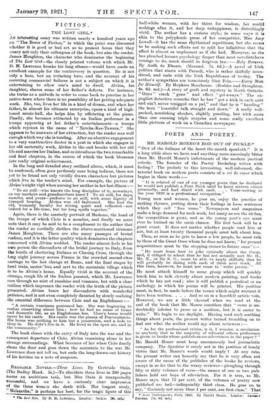FICTION.
THE LOST GIRL.*
Alt interesting essay was written nearly a hundred years ago
on " The Bores of Fiction," in which the point was discussed whether it is good or bad art so to present bores that they weary not only their colleagues of the book, but also the reader. James Houghton, the character who dominates the beginning
of The Lost Girl—the closely printed volume with which Mr. D. H. Lawrence breaks his long silence—would have made an excellent example for the controversy in question. He is not only a bore, but an irritating bore, and the account of his recurring commercial failures is not a subject on which it is entertaining to allow one's mind to dwell. Alvina, his daughter, shares some of her father's defects. For instance,
she trains as a midwife in order to come back to practise in her native town where there is no possibility of her getting adequate work. She, too, lives her life in a kind of dream, and when her
father, in almost his ultimate enterprise, opens a kind of high- toned music-hall, she helps him by officiating at the piano. Finally, she becomes attracted by an Italian performer in a troupe appearing at her father's entertainments—a troupe which rejoices in the name of " Natcha-Kee-Tawara." She appears to be unaware of her attraction, but the reader sees well
enough which way she is tending. After an abortive engagement to a very unattractive doctor in a post in which she engages in her old maternity work, Alvina in the end breaks with her old life and marries her Italian, and so introduces the two remarkable and final chapters, in the course of which the book blossoms into really original achievement.
In the long and detailed story outlined above, which, it must be confessed, often goes perilously near being tedious, there are yet to be found not only vividly drawn characters but pictures
which live in the reader's mind. For example, the picture of Alvino,'s night vigil when nursing her mother in her last illness:— "To sit still—who knows the long discipline of it, nowadays, us our mothers and grandmothers knew Y To sit still, for days, months, and years—perforce to sit still, with some dignity of tranquil bearing. Alvina was old fashioned. She had the old, womanly faculty for sitting quiet and collected—not indeed for a life-time, but for long spells together."
Again, there is the masterly portrait of Madame, the head of the troupe of which Cicio is a member, and finally we must note that it may be said to be a compliment to the author that
the reader so cordially dislikes the above-mentioned tiresome James Houghton. There are also many passages of brutal realism, and it is the latter quality which dominates the chapters concerned with Alvina wedded. The reader almost feels in his own person the discomforts of the bridal journey to Italy, from the bustle of chattering Italians at Charing Cross, through the long night journey across France in the crowded second-class carriage to the last change at Rome, and the final stages by local train, motor-'bus, and cart to the mountain village which is to be Alvina's home. Equally vivid is the account of the strange, rough life of the Italian peasant, which Mr. Lawrence cees through no mist of sunshine and romance, but with a clear realism which impresses the reader with the truth of the picture presented. .Alvina bears her discomforts with wonderful patience, and is not even completely daunted by slowly realizing the essential difference between Cicio and an Englishman :-
" A certain weariness possessed her. She was beginning to realize something about him : how he had no sense of home and domestic life, as an Englishman has. Cicio's home would never be his castle. His castle was the piazza of Pescocalascio. His home was nothing to him but a possession, and a hole to sleep in. He didn't live in it. He lived in the open air, and in the community."
The book closes with the entry of Italy into the war and the consequent departure of Cicio, Alvina remaining alone in her strange surroundings. What becomes of her when Cicio finally slams the door and goes down the mountain to the war Mr. Lawrence does not tell us, but ends the long-drawn-out history of his heroine on a note of suspense.


































 Previous page
Previous page